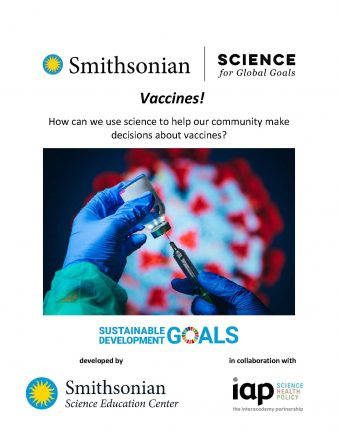As we face the spread of disease as a global community, it can be difficult to put into words what we as adults are feeling and even more challenging to discuss these feelings with young people. As the young people in your care work through this guide with you, some difficult questions may come up: How does my community think and feel about vaccines? How do vaccines work? How do we know vaccines are safe and effective? How should we make decisions about vaccines? How do I get information about vaccines? You do not need to have the answers to any of these questions. The most important thing you can offer to young people is honesty and security.
This material is based in science. One of the best ways to become comfortable with the changing state of the world is by arming yourself with knowledge, and then using that knowledge to make a difference in the world. This is true for young people as well. As youth around the globe engage with the activities in this guide, they will gain an understanding of the science that underlies vaccines. They will be able to share their knowledge with their community, create tangible ways to help their community make informed decisions in this challenging time, and understand the best places to find additional information on the topic.
But this new knowledge may also be scary and overwhelming for people who are young. They may require support and guidance from you to put their new knowledge into context. Ask the young people around you how they are feeling and what they are thinking about as they learn about vaccines. Validate the questions they ask you, even if they ask them over and over again.
These tasks are designed to be completed in collaboration with the young people in your care. Each task is driven by a question that young people may ask you about vaccines. Each task is structured in a way to help young people (and you) to: (1) discover the answers to the questions in your own community; (2) understand the science that underlies the questions; and then (3) provide guidance to help you and the young people you care for act on your new scientific knowledge.
What can young people do to use science to help their community make decisions about vaccines? Task 1 should help you and each young person you care for understand who they are so that they are better prepared to understand the concerns of others. Tasks 2–6 will help young people learn about the history of vaccines, how vaccines work, how we know vaccines are safe and effective, and how to support others in making decisions about vaccines. Tasks 7–8 will help young people combat misinformation and create an integrated action plan to help their community make decisions about vaccines. As a parent, caregiver, or educator, you may decide to skip certain questions, activities, or an entire task because it may be of concern to you. This is okay! Please personalize the interactions so that your health and safety and the health and safety of the young people in your care are of utmost concern.



